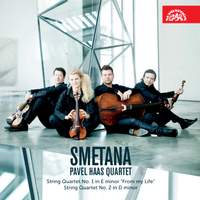Recording of the Week,
Smetana from the Pavel Haas Quartet
Ever since they were awarded Best Newcomer at the 2007 BBC Music Magazine Awards, the Pavel Haas Quartet have consistently shown themselves to be one of the most exciting, dynamic string quartets around at the moment. Almost all of their discs have had awards thrown at them, either being selected as the First Choice recording by BBC Radio 3's Building a Library programme, or being honoured at the Gramophone Awards, so it was hardly a surprise to discover that their latest disc of the two string quartets by their compatriot Bedřich Smetana, due out next Monday, maintains the astonishingly high standards that we have come to expect from them.

The first quartet was written in 1876, shortly after Smetana had become afflicted with deafness and had moved from Prague to Jabkenice, and is subtitled From My Life. As you might imagine from such a subtitle, the work is semi-autobiographical. Mostly the associations are fairly general, for example the second movement polka is meant to conjure happy memories of Smetana's youth, but there is one moment about halfway through the last movement that supposedly depicts something quite specific. The music suddenly comes to a halt, and then the first violin plays a high, sustained E natural, intended to represent the ringing in Smetana's ears that preceded his deafness.
It's a powerful moment, and one which aptly demonstrates the Haas Quartet's understanding of this music: the way they accentuate the music's stumbling and faltering after this point before finally arriving at a serene E major section is expertly done, and their tone in these closing passages, radiant one moment and poignantly hushed the next, is quite marvellous. I think it must be my favourite part of the whole quartet, especially when it receives such a masterful performance as here, not least the perfectly-placed three final placid pizzicatos that end the piece.
This range of sounds and tone colours is very much on display throughout the whole piece: for just four players it's a huge sound, right from the first chord which knocked me back in my seat! You can often hear them really digging into the strings and summoning an enormous amount of grit and power, especially the opening impassioned solo from viola player Pavel Nikl. I think what impresses me most about this quartet, though, is their extensive use of rubato: there's a tremendous amount of flexibility to the tempo that makes the music sound so free and spontaneous, and there's clearly a huge amount of communication and responsiveness between the players that comes across even without being able to see them.
No less impressive is the fiery second quartet, composed six years after the first. The ferocity with which they attack the breathlessly stormy semiquavers at the opening of the third movement, for instance, is really extraordinary: I was worried their instruments were going to break with the sheer amount of effort being applied! This force of attack continues in the final movement, which is truly exciting: their surging crescendos and diminuendos in the piece's final bars lead to an extremely exhilarating climax indeed.
So, as I said at the start, this new disc continues the phenomenally high standards set by their previous discs. With these highly expressive, virtuosic performances, the Pavel Haas Quartet have done it again!
Pavel Haas Quartet
Available Formats: CD, MP3, FLAC



